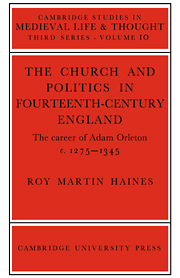Book contents
- Frontmatter
- Contents
- Preface
- Acknowledgements
- Abbreviations
- 1 APPRENTICESHIP
- 2 THE DIPLOMATIC ENVOY
- 3 THE DIOCESAN BISHOP
- 4 POLITICAL INVOLVEMENT
- 5 SUMMING UP
- APPENDIX I Worcester diocese: tables illustrating Orleton's administration
- APPENDIX 2 Letters and documents
- APPENDIX 3 Itinerary 1317–1345
- Bibliography
- Index
- Frontmatter
- Contents
- Preface
- Acknowledgements
- Abbreviations
- 1 APPRENTICESHIP
- 2 THE DIPLOMATIC ENVOY
- 3 THE DIOCESAN BISHOP
- 4 POLITICAL INVOLVEMENT
- 5 SUMMING UP
- APPENDIX I Worcester diocese: tables illustrating Orleton's administration
- APPENDIX 2 Letters and documents
- APPENDIX 3 Itinerary 1317–1345
- Bibliography
- Index
Summary
Bishop Stubbs entertained few doubts about Adam Orleton: during Edward II's reign he figures as ‘the confidential agent of Mortimer and the guiding spirit of the Queen's party’. In fact for Stubbs the dramatis personae of Edward's decline and fall are singularly uncomplicated: Ayrminne he dubs ‘the Queen's creature’, Orleton ‘Mortimer's confidant’; both are condemned as ‘lacking such slender justification as might be furnished by the fears of Stratford or the vindictiveness of Burghersh’. It was to Orleton, he writes, that ‘the guilt of complicity with the king's murder was popularly attached’; to which statement he grudgingly adds: ‘in so dark and cruel a transaction his own firm and persistent denial must be allowed to qualify the not unnatural suspicion’. The revolution over, Stubbs envisages Orleton as one who ‘quitted the field of secular preferment and devoted himself to the attainment of ecclesiastical promotion’.
T. F. Tout was at least as outspoken. According to his analysis of John XXII's appointments to the English episcopate only one bishop, Thomas de Cobham, ‘represented a high spiritual type’; his colleagues comprised ‘scandalous self-seekers of the official type such as Adam Orleton, John Stratford and William Ayrmyn’. In Tout's opinion Canon Bannister ‘makes the best case he can for Orleton's character, but he is more successful in demonstrating his ability than his morality’.
- Type
- Chapter
- Information
- Church/Politcs:Adam Orleton , pp. 199 - 208Publisher: Cambridge University PressPrint publication year: 1978

